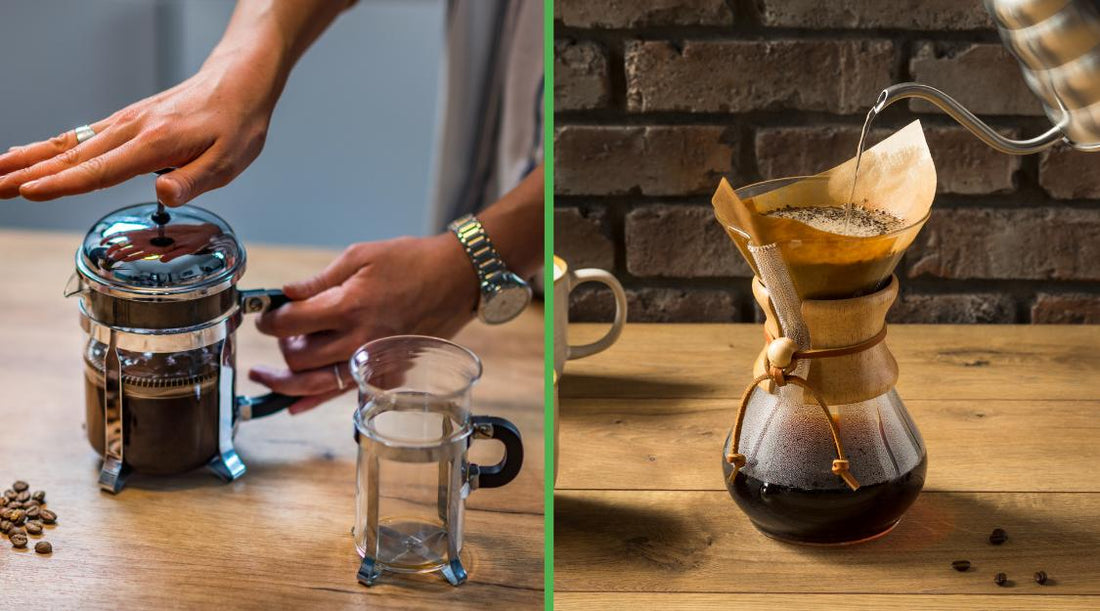
French press vs coffee dripper: Which one is best?
Share
When it comes to brewing coffee at home, there are many different methods to choose from. Two popular options are the french press and the coffee dripper (also known as a pour-over coffee maker).
Both of these methods have their own unique characteristics and can produce delicious, high-quality coffee, but which one is best for you will depend on your personal preferences and needs.
Here are some key points to consider when deciding between a french press and a coffee dripper:
Brewing process
French press and coffee dripper use slightly different brewing processes. A french press works by steeping coarsely ground coffee beans in hot water for a set amount of time, before pressing a plunger down through the water to separate the coffee grounds from the brewed coffee.
A coffee dripper, on the other hand, works by slowly pouring hot water over a bed of finely ground coffee beans that are held in a filter paper. The brewed coffee then drips through the filter paper and into a mug or carafe below.
Flavour
Both the french press and the coffee dripper can produce delicious, full-flavoured coffee. A french press tends to produce a coffee with a richer, bolder flavour, as the coffee beans are steeped in the water for a longer period of time.
Whereas, a coffee dripper produces a cleaner, clearer-tasting coffee, as the coffee grounds are filtered out during the brewing process.
Ease of use
Both the french press and the coffee dripper are relatively easy to use, but the coffee dripper may be slightly easier for beginners. The brewing process is more straightforward and requires fewer steps, and the coffee dripper is also less prone to clogging or over-extraction, which can affect the quality of the brewed coffee.
Cost
The french press and the coffee dripper are both reasonably priced options for home brewing. A coffee dripper may be a less expensive option in the short run, however, in the longer run, a french press may be less expensive as it requires the use of disposable coffee filter papers, which can add up over time, whereas the french press uses a reusable metal filter.
Grinding
The type of grind you use can have a big impact on the flavor of the brewed coffee, regardless of which brewing method you choose. For the french press, you will need to use a coarse grind, similar to the texture of kosher salt. This will allow the coffee grounds to steep in the water without over-extracting and producing a bitter taste.
For the coffee dripper, you will need to use a finer grind, similar to the texture of table salt. This will allow the water to flow through the coffee grounds more easily and extract the desired flavors.
Brewing time
The brewing time for a french press and a coffee dripper can vary depending on your personal preferences and the type of coffee beans you are using.
For the french press, the recommended brewing time is around 4-5 minutes, but you can adjust this to suit your taste.
For the coffee dripper, the brewing time will depend on the size of the dripper and the amount of coffee you are using, but a good starting point is around 2-3 minutes.
Serving size
The french press and the coffee dripper can both be used to brew coffee for one person or for a group, depending on the size of the carafe or mug you are using.
A french press typically has a larger capacity, as it uses a pot or carafe to hold the brewed coffee, whereas the coffee dripper is typically used to brew a single mug's worth of coffee at a time.
Clean-up
Both the french press and the coffee dripper are relatively easy to clean, but a coffee dripper may be slightly easier as it has fewer parts and does not require disassembling.
A french press has a plunger and a metal filter that will need to be cleaned separately, while the coffee dripper only requires you to dispose of the filter paper and rinse the dripper.
Environmental impact
If you are concerned about the environmental impact of your coffee brewing habits, both the french press and the coffee dripper have some pros and cons to consider.
A french press has a reusable metal filter, which reduces waste, but it also uses more water and energy to heat the water.
A coffee dripper requires disposable filter papers, which generates more waste (unless you use a abaca coffee filter paper which is made from manila hemp and is environment friendly) but it uses less water and energy to brew the coffee.
Overall, both the French press and the coffee dripper are excellent options for brewing coffee at home. The best choice for you will depend on your personal preferences and needs.
If you prefer a bold, full-flavored coffee, a french press may be the way to go. If you prefer a cleaner, clearer-tasting coffee, a coffee dripper may be a better choice. Ultimately, the best method for you is the one that produces the type of coffee you enjoy drinking the most.




